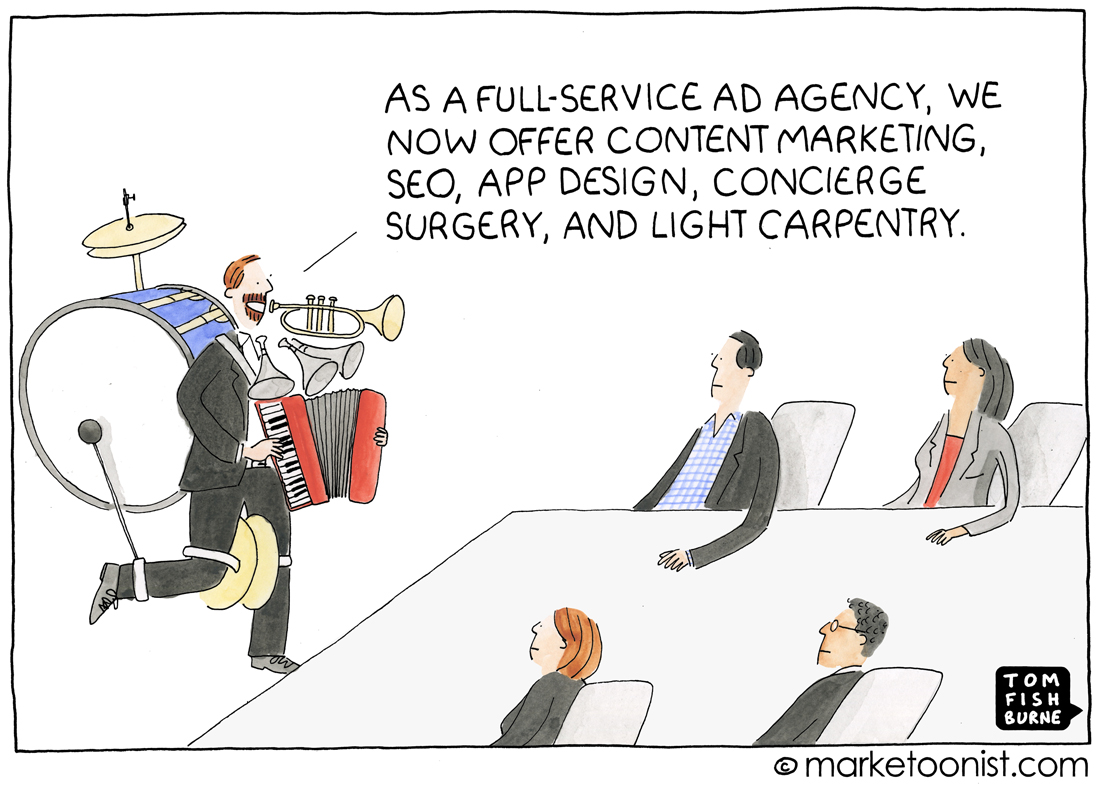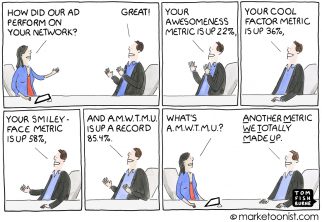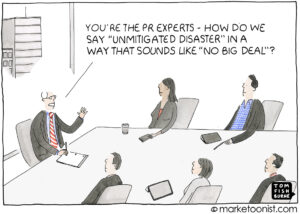It’s an age-old decision point in marketing — work with a range of specialized agencies, or find a full-service agency that can handle everything. In the last couple years, we’ve seen an ever-expanding tick-box approach to agency services. This decision point has only gotten more complicated.
In the late-90’s, I joined one of the first digital agencies in the Bay Area. We built websites, mainly for travel companies like Disney and Starwood. We were specialists and we were good at it. Then we got acquired along with 30 or so other specialist agencies and rolled-up into one big one-stop shop.
Suddenly, our new, big agency offered everything from brand identity design to consulting to advertising for every conceivable type of company. It was total chaos. I remember going to a meeting with a client to talk about an integrated plan and meeting other groups from my own company for the first time in the client’s reception area.
I learned to be wary of agencies that claim to do everything. In my experience on the client and agency sides, few agencies are capable to doing all of those things well, particularly for emerging technologies.
Yet, on the other end of the spectrum, working with a whole host of specialist, niche agencies can be a challenge. Specialist agencies tend to focus too much on their own disciplines and miss the big picture. Cobbling the work into one cohesive, fully integrated campaign can be hard. From the perspective of the consumer, everything should feel like it’s coming from one brand.
There has never been a better time to be a client, with a whole host of agency options. But it can also be overwhelming to figure out the model that’s right for a particular brand. I’d love to hear your experiences navigating this decision.



Adam Rogers says
This is a tough one with solid arguments on both sides. Personally I have also worked in both environments. The model of having a specialist agency for each key discipline is probably the best one for me, but only and I repeat ONLY if the client has the ability, desire and time to manage all agencies. If they do not have the above, which is all too often the case then a multi service agency becomes the better option.
The common problem with Full Service agencies is that they can be too quick to claim expertise in an area, usually inspired by employing someone who once tried something for a client that had minor success. However, there are some genuinely fantastic full service agencies out there.
Allen Roberts says
When I was a boy, the biggest 5 agencies in Australia had perhaps 15% of the ad revenue, the rest was distributed across many small creative shops. Their product was creative solutions to marketing problems, and the environment was conducive to some great work. It was competitive and varied, interesting and emotionally charged.
Now the industry is run worldwide by a few groups run by bean-counters to whom creativity and marketing outcomes are measured only by the P&L of their mega agencies. As an by-product of this swing to the rational, short term, and quantitative, the product is now crappy because everyone is focused on cost and risk minimisation.
I am sure there are some great agencies out there, I just have not found them.
Hugh Hubbard says
Similar problem with data [marketing research]. Presently ‘data-providers’ seem to be expert at analysis [breaking things into component parts] and the missing bit is synthesis [putting all the data back together to focus on the marketing application]. When will we have ‘full service data house’ offerings – doubtless some are already going down this path. How many CMO’s are doing the synthesis job [albeit an increasingly tricky one] or outsourcing?
Similar risks with Global positioning & execution of ‘global’ brands. Not so? A nifty luxury positioning in French, in Paris, sometime don’t work real well in Zezuru, in Harare.
Elisabeth Diehl says
Really good points! But als always there might something good in between. My experience is that many companies struggle to see the BIG picture and build a long term strategy. So I see the advantage of a full service agency in consultancy and the minor ‘friction loss’ that they can offer on the Basis of having a broad experience in tools and experts working together under one roof.
Will Alan Fleming says
As a principle in a “niche” content agency, I am always faced with demand to expand our services from clients who have partnered with us on a project and had a good experience. In the end we have always decided to stay close to our expertise, creating compelling solution based stories for the technology sector, but it can be very tempting to become a brand shop or a marketing automation shop or even a full service agency. The thought of doubling or even tripling the size of your agency overnight can be enticing. My fear has always been that it will put too much focus on expenses and business development and take my team away from doing what we enjoy and do best. Glad to read others perspective here.
Jann Mirchandani says
You hit the nail on the head! I face the same struggle but, like you, end up focusing on what we do best.
I find that having a strong team of collaborative partners helps; we work well together and can offer each other expertise in areas where we aren’t as strong. Ultimately, we end up functioning like an agency with just the experts that a given project demands. And no overhead where a project doesn’t require it.
Tim Mace says
When I started work in the early 1980s, our London ad agency did everything else too (at least that’s what they told us!). Then media buying specialists and promotional agencies invented themselves and it all became increasingly fragmented, especially with the advent of the web. Next thing, WPP et al scooped up the independents and regulated them again under one big ugly banner, which none of them seem to enjoy. Ever tried herding cats!?
Maryam Monazam says
Luckily there is a third model growing lately and that’s consulting companies with mission of governing (scouting, managing, evaluating) numerous specialized agencies on behalf of the client.
The expertise and experience of these companies in the field of marketing and new technology would save huge amount of time and money and guarantees the coherence of the big picture.
I believe this is a better choice than going with a full-service agency (which is risky and limiting) or create an internal expert team to manage numerous specialized agencies (which is not sustainable).
BC says
Been on both sides of selling marketing services, so I could write pages on this topic (started doing it here, decided to spare you! 😉 but what always comes to mind about being “full service” is the inevitable prospect/client question: “we understand you do all that but what are you GOOD at?”
Eoin Cannon says
“Better to be a meaningful specific than a wandering generality” – Zig Ziggler, from Seth Godin
I think that’s what brands are, and what agencies are. Full Service Agencies can’t do everything well.
Rick Pullan says
The nub today & going forward for the client is how good your people are at working with data and customer knowledge, the ability & agility to aggregate data across the whole organisation and work with key data stakeholders and users to DISCOVER new revenue and profit gaps or opportunities; in particular how to build a ‘direct connection’ with end users based on transactional behaviour. The task then is to ACTIVATE those opportunities to DELIVER the extra profit using the most appropriate priority resource to make target end user customers WANT the proposition, buy it &/or recommend it, whether it’s a trusted resource you know or whether you have to find it. The rest of the debate is a bit like ‘putting the cart before the horse’, which means that an awful lot of budget and shareholder funds are likely to be wasted. I hope this provocative thinking is usable.
Neha Vyas says
I have worked with both kinds of set up and I believe that a midway approach of bucketing agencies works well. For example, giving the same agency – Social, Content, SEO and website management and bucketing analytics & media planning/buying together, existing customer communication & analytics for the same should be bucketed together too. Creative (ATL+BTL), Creative (Digital), PR & Technology competencies should stay out of these buckets – as a client I have also tried to create a quarterly platform where all agencies come together for a brainstorming to work on the brand and business strategy together. It is a time consuming exercise from the client end – but it has proven to be extremely useful for me. I believe that in a lot of cases agency output is as good as client brief and clear setting of KPI’s at the start of the relationship. Investing the right kind of time and faith in agencies – no matter what the model – always pays off.
Nina C says
Either way it highlights the importance of effective management and strategic thinking in an organisation. Whether to direct one agency or to manage multiple. Same goes for the wealth of tools out there such as automation. While good, they will function as well as the person who stitches it all together. Critical thinking and problem solvers and creativity and relational skills are indispensable for any organisation that wants to grow and often these come via a good marketer. If you have the “right” markets internally they will be able to navigate the maze of appointing and managing the right agencies.